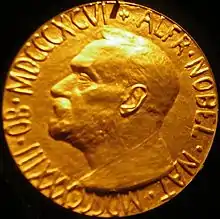Irwin Rose
Irwin A. Rose (16 Temmuz 1926 - 2 Haziran 2015), Amerikalı biyolog. 2004 yılında "Ubikuitin-aracılı protein yıkımının keşfi" nedeniyle[1], Aaron Ciechanover ve Avram Hershko ile birlikte, Nobel Kimya Ödülü'nü kazanmıştır.
Irwin A. Rose | |
|---|---|
 | |
| Doğum |
16 Temmuz 1926 Brooklyn, New York, ABD |
| Ölüm |
2 Haziran 2015 (88 yaşında) Deerfield, Massachusetts, ABD |
| Milliyet | ABD |
| Eğitim | Chicago Üniversitesi |
| Ödüller |
|
| Kariyeri | |
| Dalı | Biyoloji |
| Çalıştığı kurumlar | Kaliforniya Üniversitesi, Irvine Tıp Okulu |
Rose, II. Dünya Savaşı'nda görev yapmak için Amerika Birleşik Devletleri Deniz Kuvvetleri'ne katılmadan önce bir yıl boyunca Washington Devlet Üniversitesi'nde okudu. Savaştan döndükten sonra Chicago Üniversitesi'nde, 1948'de lisans, 1952'de biyokimya dalındaki doktora eğitimi tamamladı. Ölümüne kadar, Kaliforniya Üniversitesi, Irvine Tıp Okulu'nda (University of California, Irvine School of Medicine) fizyoloji ve biyofizik bölümünde profesör olarak görev yapmaktaydı. 2 Haziran 2015 tarihinde, Massachusetts'de öldü.[2]
Yayınları
- Hershko, A., Ciechanover, A., and Rose, I.A. (1979) "Resolution of the ATP-dependent proteolytic system from reticulocytes: A component that interacts with ATP". Proc. Natl. Acad. Sci. USA 76, pp. 3107–3110.
- Hershko, A., Ciechanover, A., Heller, H., Haas, A.L., and Rose I.A. (1980) "Proposed role of ATP in protein breakdown: Conjugation of proteins with multiple chains of the polypeptide of ATP-dependent proteolysis". Proc. Natl. Acad. Sci. USA 77, pp. 1783–1786.
Kaynakça
- Nobel Kimya Ödülü 2004. Nobel Foundation. Nobelprize.org/Nobel Kimya Ödülü 2004 9 Temmuz 2006 tarihinde Wayback Machine sitesinde arşivlendi. Erişim tarihi 05.07.2009 (İngilizce)
- Chang, Kenneth (2 Haziran 2015). "Irwin A. Rose, Nobel-Winning Biochemist, Dies at 88". New York Times. 3 Ekim 2015 tarihinde kaynağından arşivlendi. Erişim tarihi: 4 Haziran 2015.
- Rose, Irwin (2005), "Early work on the ubiquitin proteasome system, an interview with Irwin Rose. Interview by CDD.", Cell Death Differ., 12 (9), ss. 1162-6, doi:10.1038/sj.cdd.4401700, PMID 16094392
- "Nobel Prize in Chemistry, 2004. Aaron Ciechanover, Avram Hershko and Irwin Rose.", Indian J. Physiol. Pharmacol., 49 (1), s. 121, 2005, PMID 15881872
- Latonen, Leena; Laiho, Marikki (2004), "Nobel prize in chemistry goes to three persons with a key role in revealing the ubiquitin-mediated protein degradation pathway", Duodecim; lääketieteellinen aikakauskirja, 120 (24), ss. 2868-71, PMID 15700582
- Goldberg, Alfred L (2005), "Nobel committee tags ubiquitin for distinction.", Neuron (3 Şubat 2005 tarihinde yayınlandı), 45 (3), ss. 339-44, doi:10.1016/j.neuron.2005.01.019, PMID 15694320
- Neefjes, J; Groothuis, T A M; Dantuma, N P (2004), "The 2004 Nobel Prize in Chemistry for the discovery of ubiquitin-mediated protein degradation", Nederlands tijdschrift voor geneeskunde (25 Aralık 2004 tarihinde yayınlandı), 148 (52), ss. 2579-82, PMID 15646859
- Vogel, Gretchen (2004), "Nobel Prizes. Gold medal from cellular trash.", Science (15 Ekim 2004 tarihinde yayınlandı), 306 (5695), ss. 400-1, doi:10.1126/science.306.5695.400b, PMID 15550643
- Giles, Jim (2004), "Chemistry Nobel for trio who revealed molecular death-tag.", Nature (14 Ekim 2004 tarihinde yayınlandı), 431 (7010), s. 729, doi:10.1038/431729a, PMID 15483574
Dış bağlantılar
- Nobel citation 23 Temmuz 2008 tarihinde Wayback Machine sitesinde arşivlendi.
- Rose Nobel Prize lecture
- Fox Chase Cancer Center News
This article is issued from Wikipedia. The text is licensed under Creative Commons - Attribution - Sharealike. Additional terms may apply for the media files.
